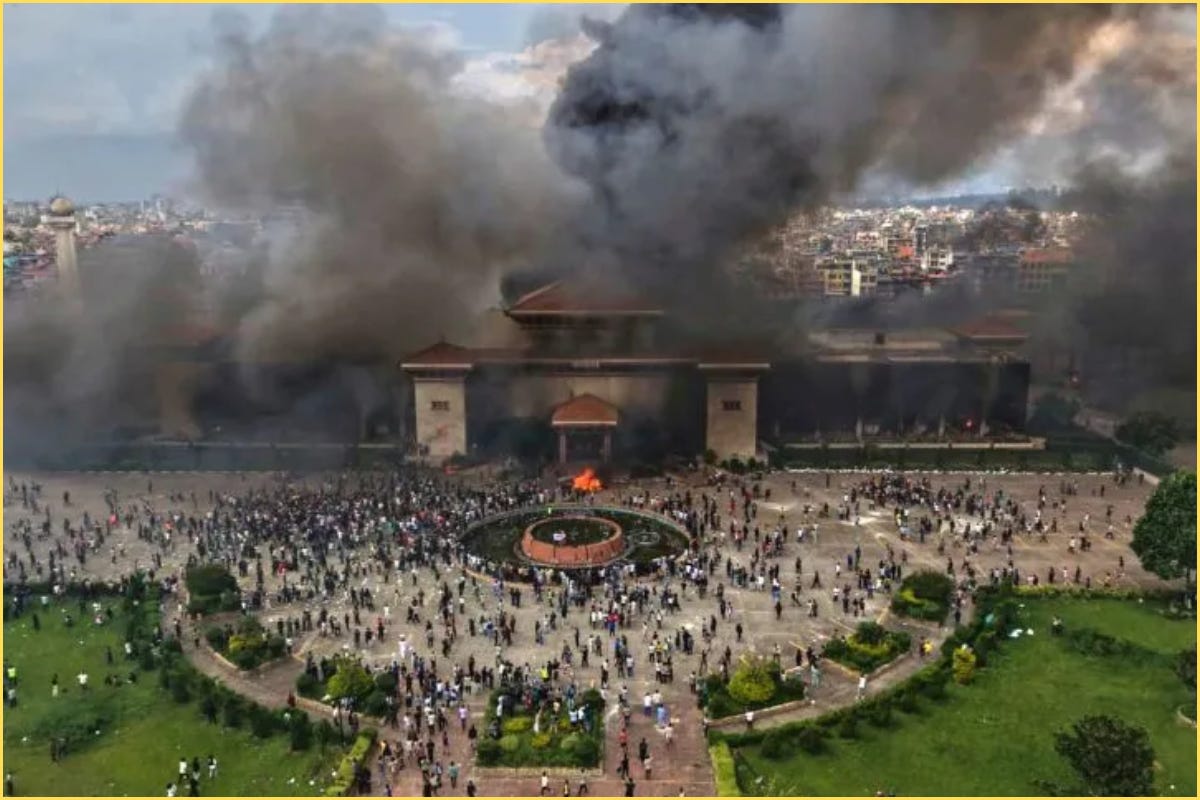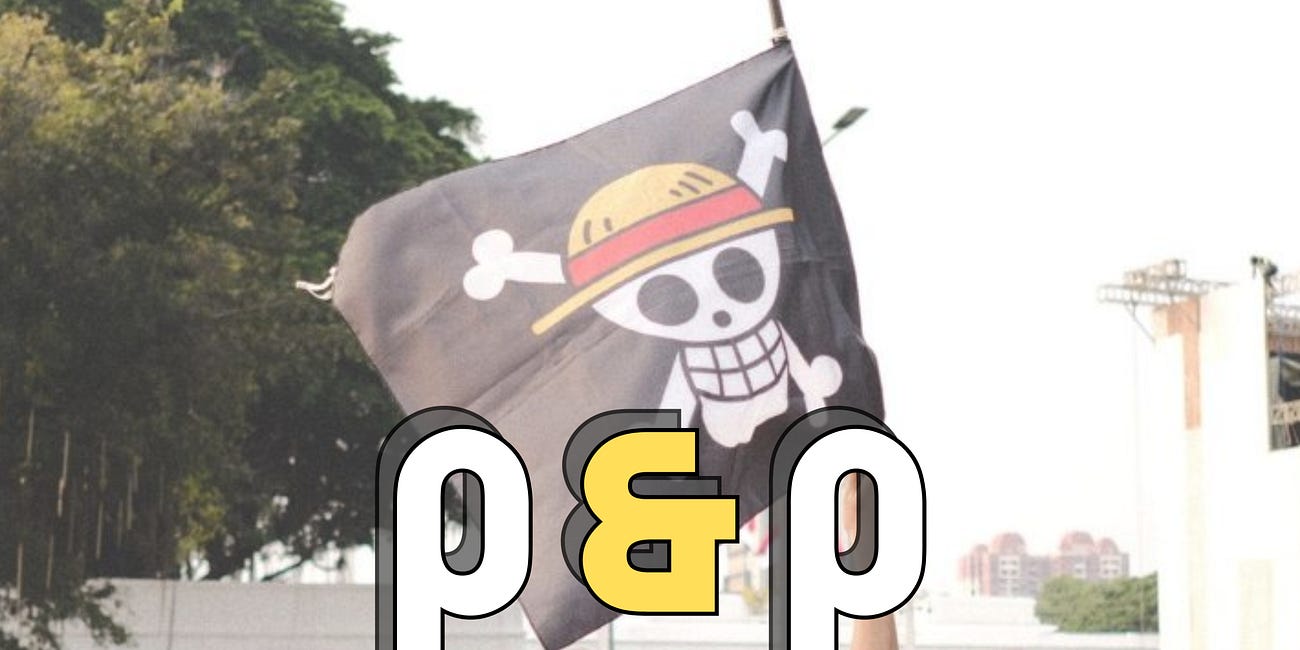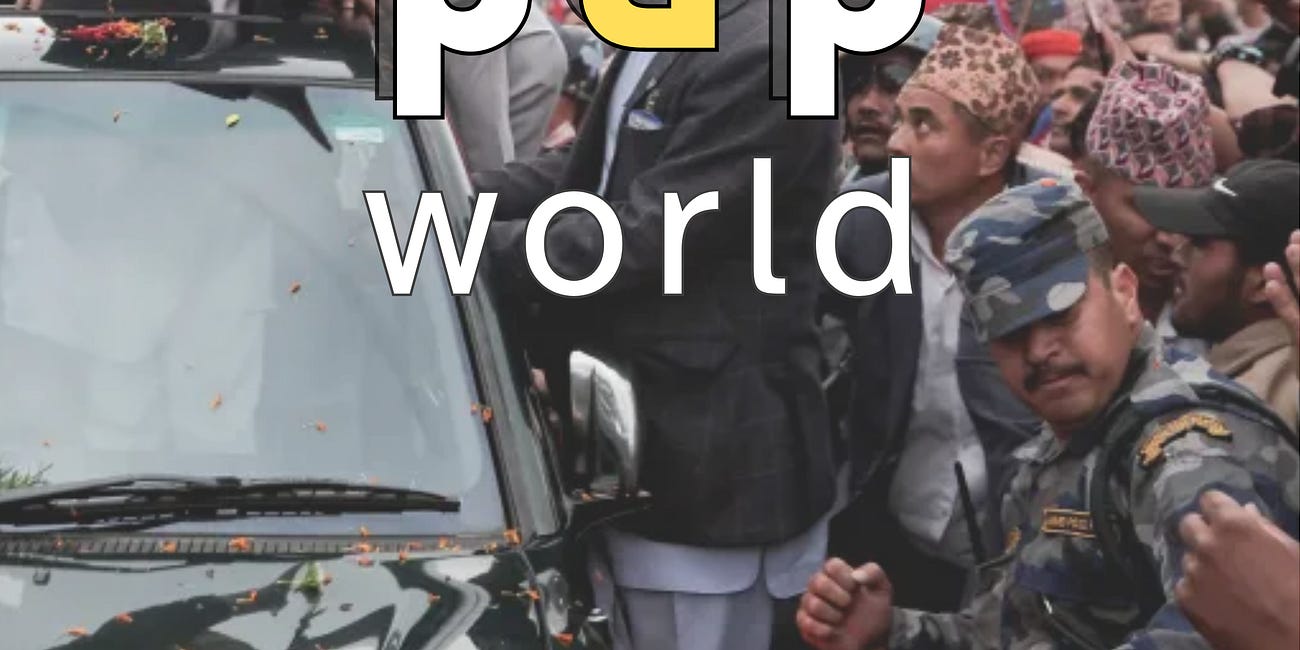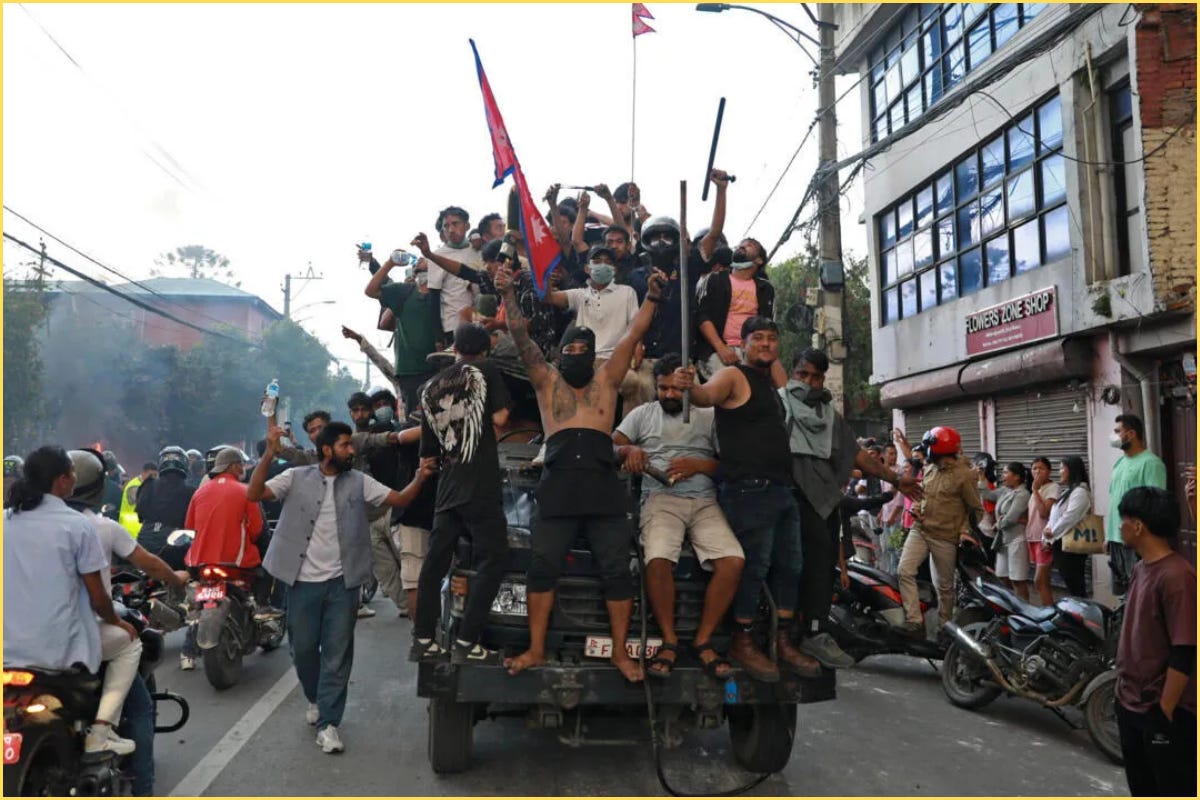how gen z overthrew nepal’s government
a generation pushed back against corruption and privilege, and toppled the order that sustained it
I didn’t need a headline to know what was happening in Nepal. The videos spoke for themselves. Parliament in flames, ministers fleeing their homes, black smoke rising above Kathmandu. A government thought it could flick off 26 social media platforms and silence a generation. Instead, it silenced itself.
This wasn’t just vandalism. Protesters chose their targets carefully. They set fire to parliament, to the Supreme Court compound, to Singha Durbar (the vast government administrative complex that houses the prime minister’s office). They stormed party headquarters, and torched the homes of former prime ministers and sitting ministers. Reports said at least one politician’s spouse was caught inside a burning residence. They also struck symbols of wealth and privilege: the Hilton Kathmandu, Nepal’s tallest hotel, was set ablaze just a year after it opened, the Hyatt Regency was attacked, and the Varnabas Museum Hotel was damaged. These weren’t random acts. They were direct replies to years of corruption, dynastic arrogance, and impunity. Luxury hotels became targets because they symbolized wealth and privilege in a country where most struggle to survive. Institutions and monuments that shielded elites for decades suddenly became combustible, and the people lit the match.
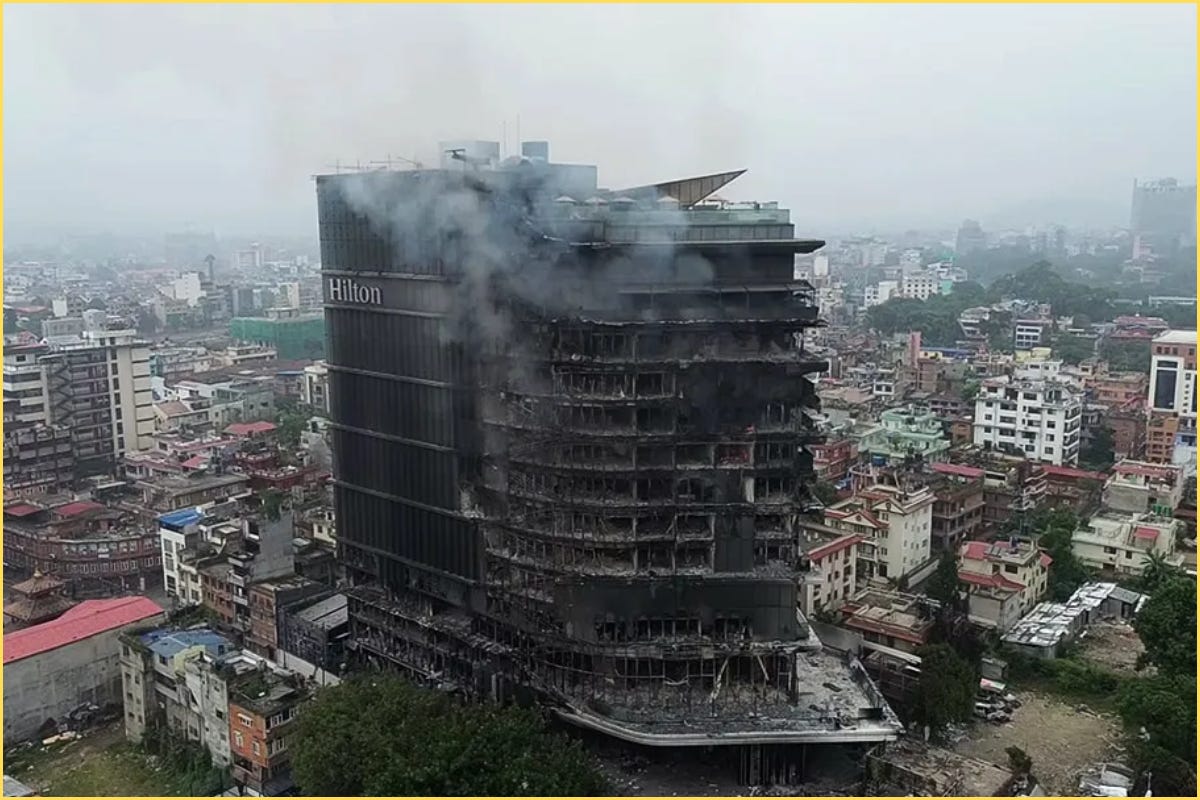
It began with a ban. The government blocked Facebook, WhatsApp, Instagram, YouTube, spaces where a generation lives, studies, and organizes. The move was meant to cut off a viral campaign mocking the “nepo kids,” the privileged sons and daughters of politicians flaunting luxury online while ordinary families scraped by. But what the ban really did was prove the point: this wasn’t a democracy, it was elite rule with ballots as costume. When that mask slipped, Gen Z refused to put it back on.
The crackdown was brutal. Tear gas, batons, rubber bullets, and live rounds. At least nineteen killed in a single day, hundreds injured. Human Rights Watch described an “appalling disregard for the lives of its own citizens”. But instead of retreating, the crowds grew. The killings only hardened the truth already burning in people’s minds, the state does not protect you, it only protects itself.
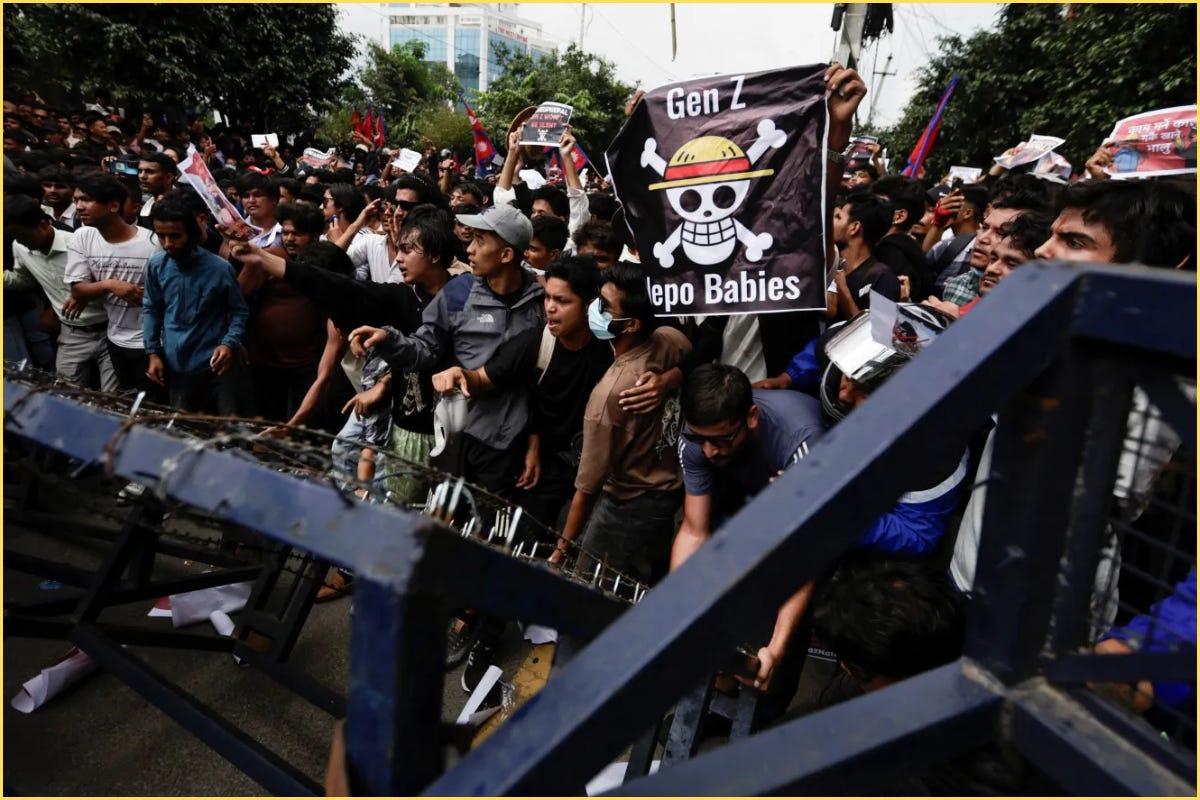
indonesia's straw hat rebellion
In One Piece, pirates aren’t just criminals. They’re outcasts who challenge corrupt empires, chasing freedom with nothing but loyalty to their crew. That’s why, in Indonesia today, thousands are marc…
Within days, Oli’s resignation followed. The government was blamed for the deadliest crackdown in a decades and even his coalition allies started breaking ranks. After he stepped down, Finance Minister Bishnu Prasad Paudel was chased and beaten in the street. Sher Bahadur Deuba, a former prime minister and long-time pillar of the political elite, was attacked at his own home. In those moments the untouchable were suddenly vulnerable. The elite bled alongside everyone else, and the illusion of immunity collapsed. The ban was gone. The spell was broken. The world saw ministers run away from where they once ruled.
And it all happened so fast because it wasn’t peaceful. This was not a sit-in or a symbolic hunger strike. It was an uprising. History shows us that polite protests rarely deliver freedom. The stories we’re fed have been rewritten to blunt their edge. Martin Luther King Jr. is remembered as the saint of nonviolence, but the state harassed and manipulated him, eager to manage rather than meet his demands. Gandhi is celebrated as the face of peaceful resistance, but empire preferred him to the armed struggles that posed a sharper threat. Nelson Mandela is held up as reconciliation’s icon, but before that, he was the man who helped found an armed movement and spent 27 years in prison without renouncing it. Malcolm X said plainly that power only responds to power, and he was killed for it.
Nepal’s Gen Z didn’t need theory to understand this. They lived it. They saw their classmates migrating for survival. Basically modern day slavery, with Nepal selling its people abroad for remittances, all the while ministers’ children flaunted privilege online. They saw futures pawned away. When their voices were cut off with a ban, they answered with fire. The social pyramid flipped upside down, even if only for days.
None of this came out of nowhere. Nepal’s democracy has been broken for years, as I wrote back in May in my piece why some nepalis want the king back. Fourteen governments since 2008, the same three men rotating power, corruption baked in, and an economy propped up by remittances from exploited migrant workers. Nearly a third of the country’s GDP comes from this money, with more than 2,000 young Nepalis leaving every day to work in the Gulf, Malaysia, Japan or South Korea. Average wages at home hover around $200–300 a month, barely enough to cover rising costs, while unemployment for people under 25 sits above 20 percent. Families survive on what sons and daughters send back, often earned in brutal conditions abroad.
why some nepalis want the king back
Last year I wrote this story. It was about the royal massacre in Nepal back in 2001. Crown Prince Dipendra allegedly killed his whole family. His father the king, his mother the queen, his brother, a…
When the smoke cleared, more than 72 people were dead and over a thousand injured. Curfews emptied the streets, but even that could not disguise the scale of what had happened. The president dissolved parliament, the army brokered talks with student leaders (the army is loved in Nepal), and in a stunning turn, former chief justice Sushila Karki was sworn in as interim prime minister. The first woman ever to lead Nepal. Her clean reputation and anti-corruption stance made her the compromise choice of both protesters and the establishment. An old order had collapsed, and the youth had forced open the door to something new.
Nepal matters because it shows us what’s true everywhere. Democracy, in its current form, is too often a closed club. Elections rotate the faces, but power stays fixed in families, in donors, in networks of privilege. Corruption is not a bug of the system, it is the system. And no committee or commission is going to correct that. Only people will.
What the Nepalese did should not be exoticized as some distant chaos. It should be recognized as a mirror. The same frustrations exist from Washington to Paris to Istanbul to Dhaka to Nairobi to Lagos. Young people locked out (politically, but more importantly economically), elites flaunting power, governments deaf until the streets get loud enough to shake their walls. Nepal is not “them.” Nepal is us. Their fire is a warning that what happened there is part of our story too.
The question is not whether their actions went too far. The question is why, in so many countries, we continue to go nowhere. The Nepalese didn’t wait for permission. They didn’t beg for reform. They made the elite feel fear for once, and in doing so they reminded the rest of us of a lesson too easily forgotten, power yields when people take it. That is what accountability looks like when all else fails.
foreign interference?
However, This domestic collapse also cannot be separated from the region around it. Nepal’s turmoil inevitably reverberates beyond its borders since its caught between two giants who watch closely. India and China had just met recently at the SCO summit in Tianjin. For Washington, unrest on their shared frontier is convenient. A sudden explosion in Nepal creates pressure, a ready‑made flashpoint.
It doesn’t take much imagination to see how outside actors could amplify discontent with operatives on the ground or bot farms online. The coincidence of upheaval just as Beijing and New Delhi explored closer ties is hard to ignore. A China and India that draw nearer is not in U.S. interests. It feels similar to what is happening in Indonesia where online agitation and street anger erupted into fierce protests. A new Nepali government would do well to remember geography. The only wise course is to maintain friendly ties with both and avoid reckless alignment with Washington. Nepal is not Indonesia, and it cannot afford to play that game.
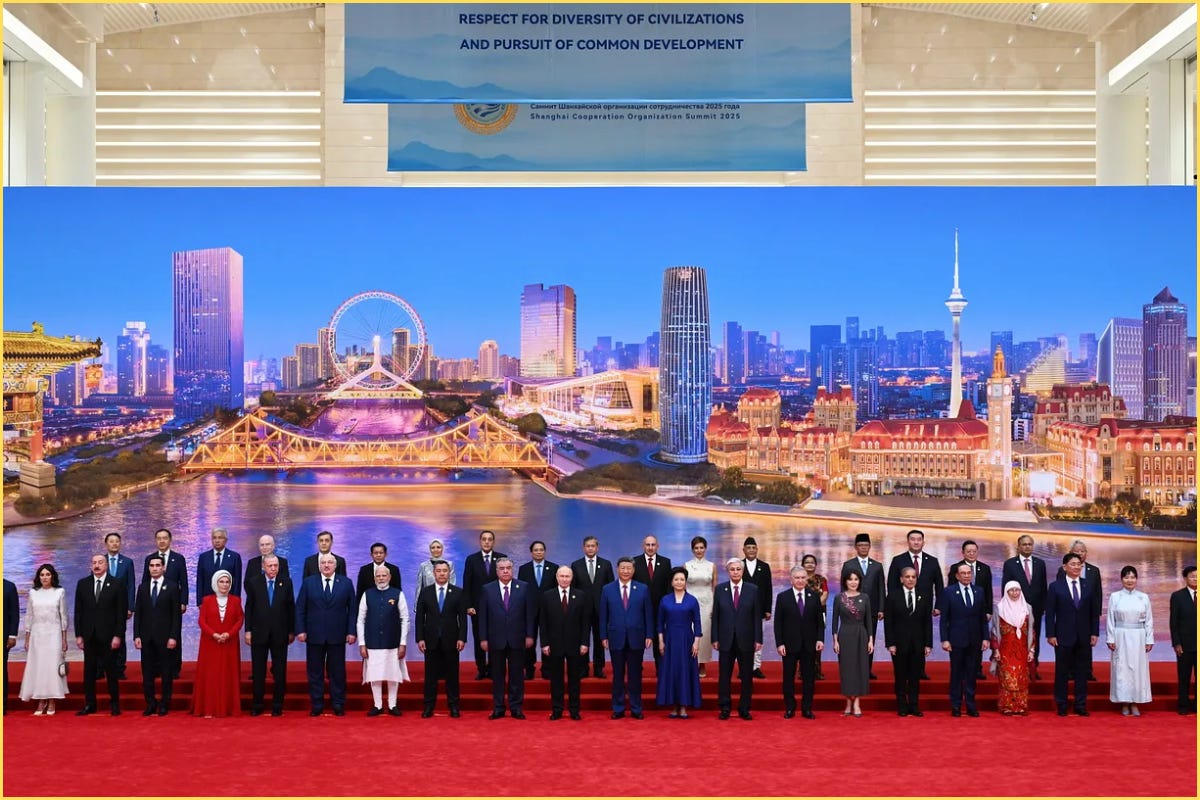
Nepal is all of us. Their uprising is not a local anomaly but part of a global truth, that ordinary people everywhere hold the final word, if only they are willing to say it loudly enough. The buildings burned in Kathmandu may stand half a world away, but the smoke drifts over every capital. It asks us, when will we do the same?



